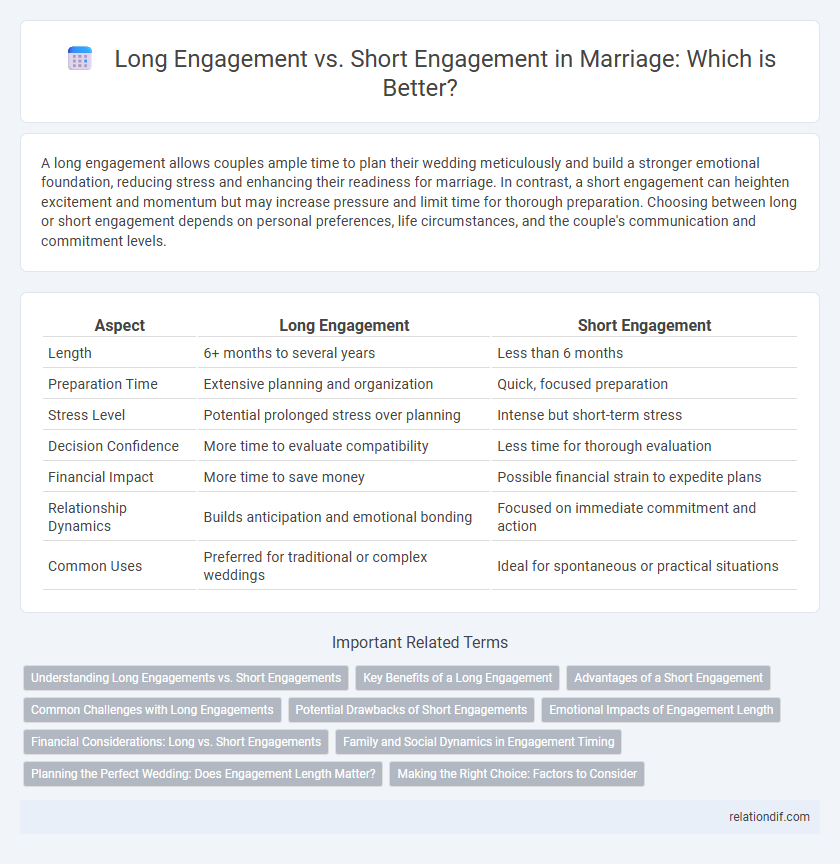A long engagement allows couples ample time to plan their wedding meticulously and build a stronger emotional foundation, reducing stress and enhancing their readiness for marriage. In contrast, a short engagement can heighten excitement and momentum but may increase pressure and limit time for thorough preparation. Choosing between long or short engagement depends on personal preferences, life circumstances, and the couple's communication and commitment levels.
Table of Comparison
| Aspect | Long Engagement | Short Engagement |
|---|---|---|
| Length | 6+ months to several years | Less than 6 months |
| Preparation Time | Extensive planning and organization | Quick, focused preparation |
| Stress Level | Potential prolonged stress over planning | Intense but short-term stress |
| Decision Confidence | More time to evaluate compatibility | Less time for thorough evaluation |
| Financial Impact | More time to save money | Possible financial strain to expedite plans |
| Relationship Dynamics | Builds anticipation and emotional bonding | Focused on immediate commitment and action |
| Common Uses | Preferred for traditional or complex weddings | Ideal for spontaneous or practical situations |
Understanding Long Engagements vs. Short Engagements
Long engagements often provide couples with extended time for financial planning, emotional growth, and wedding preparations, leading to a more deliberate and confident commitment. Short engagements typically emphasize swift decision-making and can heighten excitement but may increase stress due to compressed planning timelines. Understanding the balance between engagement length and relationship readiness helps couples align expectations and build a strong foundation for marriage.
Key Benefits of a Long Engagement
A long engagement allows couples ample time to plan their wedding meticulously, reducing stress and ensuring all details align with their vision. It provides an opportunity for partners to strengthen their relationship, communicate expectations, and address potential challenges before marriage. Financially, a prolonged engagement enables better savings management, allowing for a more comfortable start to married life.
Advantages of a Short Engagement
A short engagement offers the advantage of maintaining excitement and momentum between partners, reducing prolonged stress and anxiety associated with extended planning periods. Coupling planning and preparation within a concise timeframe often leads to heightened efficiency and greater focus on essential aspects of the wedding. Couples benefit from preserving emotional intimacy and minimizing external interference by limiting the engagement duration.
Common Challenges with Long Engagements
Long engagements often face common challenges such as prolonged uncertainty, which can lead to relationship strain and increased anxiety about the future. Couples may experience financial stress due to extended wedding planning timelines and difficulty maintaining motivation for long-term commitment rituals. Communication breakdowns and external pressures from family or friends can further complicate the emotional dynamics during a lengthy engagement period.
Potential Drawbacks of Short Engagements
Short engagements often limit the time couples need to thoroughly understand each other's values, financial habits, and long-term goals, potentially leading to overlooked incompatibilities. The compressed timeline can increase stress and pressure to plan wedding logistics quickly, detracting from relationship quality and preparedness for marital challenges. Insufficient premarital counseling opportunities during short engagements may result in unresolved conflicts and unrealistic expectations after marriage.
Emotional Impacts of Engagement Length
Long engagements often foster deeper emotional preparation and stronger communication between partners, reducing anxiety before marriage. Short engagements can create intense excitement but might increase stress due to limited time for planning and adjustment. Understanding these emotional impacts helps couples choose an engagement length that supports their mental well-being and relationship stability.
Financial Considerations: Long vs. Short Engagements
Long engagements often increase wedding costs due to prolonged vendor bookings, venue holds, and ongoing outfit updates, impacting overall financial planning. Short engagements may reduce expenses by minimizing the booking timeline and limiting prolonged expenses, but they can strain budgets with rushed, last-minute decisions. Couples should weigh these financial dynamics to optimize budget management and avoid unexpected costs in their marriage preparation.
Family and Social Dynamics in Engagement Timing
Long engagements often facilitate deeper family bonding and allow ample time for both families to integrate socially, fostering stronger relationships before marriage. Short engagements may limit opportunities for extended family interactions and adjustment, potentially increasing stress in social dynamics. Balancing engagement length can help manage family expectations and support a smoother transition into married life.
Planning the Perfect Wedding: Does Engagement Length Matter?
Engagement length significantly impacts wedding planning, with longer engagements offering couples ample time to book venues, arrange vendors, and customize details, resulting in a more personalized celebration. Short engagements often necessitate expedited decision-making, which can increase stress but may lead to a spontaneous and intimate event. Ultimately, the ideal engagement length depends on the couple's priorities, budget, and availability, with strategic planning ensuring a perfect wedding regardless of duration.
Making the Right Choice: Factors to Consider
Choosing between a long engagement and a short engagement depends on several factors including emotional readiness, financial stability, and wedding planning logistics. A longer engagement allows ample time to save money, coordinate family schedules, and address potential relationship challenges, while a shorter engagement may suit couples eager to start their married life promptly or those with immediate logistical needs. Assessing personal circumstances, communication dynamics, and future goals is crucial to making the right choice for a successful marriage foundation.
long engagement vs short engagement Infographic

 relationdif.com
relationdif.com